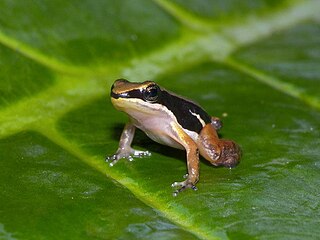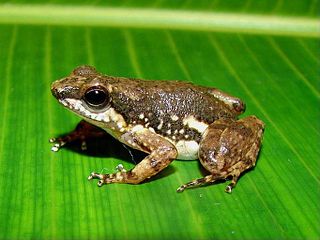
Colostethus is a genus of poison dart frogs native to Central and South America, from Panama south to Colombia, Ecuador, and northern Peru. Their common name is rocket frogs, but this name may refer to frogs in other genera and families, following the taxonomic revision of the genus in 2006.
Leptodactylodon mertensi is a species of frog in the family Arthroleptidae. It is endemic to the mountains of western Cameroon and occurs on the southern slopes of the Bamileke Plateau, Mount Nlonako, and Mount Manengouba. The specific name mertensi honours Robert Mertens, a German zoologist and herpetologist. Common name Mertens' egg frog has been coined for it.
"Centrolene" medemi is a species of frog in the family Centrolenidae. The species occurs in the Cordillera Oriental in the Tolima, Caquetá, and Putumayo Departments in Colombia and adjacent Napo in Ecuador. The generic placement of this species within the subfamily Centroleninae is uncertain. The specific name medemi honors Fred Medem, collector of the holotype. Common name Medem giant glass frog has been coined for it.
Colostethus agilis is a species of frog in the family Dendrobatidae. It is endemic to Colombia. Its natural habitats are subtropical or tropical moist montane forests and rivers.
Hyloxalus cevallosi, also known as Palanda rocket frog, is a species of poison dart frogs in the family Dendrobatidae. It is named after Gabriel Cevallos García, a famous Ecuadorean writer. This species of frog occurs on the east side of the Andes in Ecuador in the Pastaza Province. Its natural habitats are very humid premontane and pluvial premontane forests.
Hyloxalus exasperatus or the Yapitya rocket frog is a species of frog in the family Dendrobatidae. It is endemic to Ecuador and found on the eastern slopes of the Andes in Pastaza and Morona-Santiago Provinces. However, it is suggested that specimens from Pastaza represent a different, possibly undescribed species.

Leucostethus fraterdanieli is a species of frog in the family Dendrobatidae. It is endemic to the Andes in Colombia. Colostethus yaguara might be its junior synonym.
Colostethus imbricolus is a species of frog in the family Dendrobatidae. It is endemic to Colombia.

Colostethus inguinalis is a species of frog in the family Dendrobatidae. It is endemic to northwestern and northcentral Colombia. Its vernacular name is common rocket frog, although this name can also refer to Colostethus panamansis that until 2004 was considered a junior synonym of Colostethus inguinalis. Much of the older literature on Colostethus inguinalis is actually about Colostethus panamansis.
Colostethus jacobuspetersi, commonly known as the Quito rocket frog, is a species of frog in the family Dendrobatidae.
Colostethus latinasus is a species of frog in the family Dendrobatidae. It is known from Cerro Pirre in Darién Province, Panama, from Chocó Department in adjacent Colombia, and from Tierralta, Córdoba Department, Colombia.

Colostethus panamansis, also known as the Panama rocket frog or (ambiguously) common rocket frog, is a species of poison dart frog. It is found in northwestern Colombia and Panama. It is one of the best studied poison dart frogs; however, until 2004 Colostethus panamansis was considered a synonym of Colostethus inguinalis, and consequently the older literature uses that name.

Colostethus pratti is a species of frog in the family Dendrobatidae. It is found in the northwestern Colombia and Panama, possibly also in southeastern Costa Rica. It is sometimes known as the Pratt's rocket frog. Colostethus pratti is named after Antwerp Edgar Pratt, an explorer who collected the type series.
Colostethus thorntoni is a species of frog in the family Dendrobatidae. It is endemic to Colombia where it is known from the Cordillera Central in the Antioquia Department.
Hyloxalus toachi is a species of frog in the family Dendrobatidae. It is endemic to northwestern Ecuador.
Pristimantis cabrerai is a species of frog in the family Strabomantidae. It is endemic to Colombia and is known from the Cordillera Occidental in Antioquia and Caldas Departments. Although common name Valle robber frog has been suggested for it, the specimen from Valle del Cauca is no longer assigned to this species.
Serranobatrachus delicatus is a species of frog in the family Strabomantidae. It is endemic to the Sierra Nevada de Santa Marta, Colombia, and is only known from the Magdalena Department. Common name delicate robber frog has been coined for this species.
Strabomantis ingeri, also known commonly as Inger's robber frog, is a species of frog in the family Strabomantidae. The species is native to Colombia.
Gastrotheca bufona is a species of frog in the family Hemiphractidae. It is endemic to Colombia and known from the Cordillera Central and Cordillera Occidental in Antioquia and Caldas Departments, at elevations of 1,430–2,200 m (4,690–7,220 ft) asl. The specific name bufona is derived from Spanish bufón, meaning a jester or clown, and refers to the frog's "gaudy" appearance.
Colostethus ucumari is a species of frog in the family Dendrobatidae. It is endemic to Colombia.





